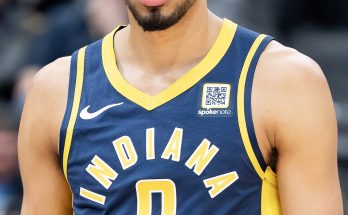Congratulations to Samson Okunlola and Emory Williams, the first 2.5-year graduates in program history! In an era where student-athletes face increasing challenges both on and off the field, what these two young men have accomplished transcends the traditional milestones of athletic and academic success. Their ability to complete their undergraduate degrees in just two and a half years is a testament not only to their discipline and intelligence but to their relentless pursuit of excellence in every aspect of their lives.
Samson Okunlola and Emory Williams arrived on campus with lofty expectations placed on their shoulders. As high-profile recruits, they were expected to contribute on the field and embody the ideals of a program that prides itself on producing leaders, not just athletes. From the beginning, both players made it clear that they were not interested in being average. They were here to maximize their potential and redefine what it means to be a student-athlete.
Graduating college in under three years is no small feat, even for students who aren’t juggling the demands of early morning lifts, late-night film sessions, and grueling practices. For Samson and Emory, the path to early graduation was paved with sacrifice, focus, and meticulous time management. Every day required prioritizing long-term goals over short-term comfort. While many of their peers were enjoying downtime between practices and class, these two were often in study sessions, knocking out papers, or consulting with academic advisors on how to maintain their ambitious pace.
The academic workload alone was staggering. Completing a standard four-year curriculum in 2.5 years required taking on heavier course loads each semester, sacrificing holidays and summers for accelerated sessions, and maintaining high academic performance while also competing at the highest level of collegiate athletics. The mental stamina to maintain such a routine is staggering, and it speaks volumes about the character of both individuals.
Samson Okunlola, a towering presence on the offensive line, is often praised for his physical prowess and competitive edge. But those close to the program will tell you that his real superpower might just be his work ethic and intellectual curiosity. Known for his thoughtful questions in team meetings and his methodical approach to both blocking schemes and life goals, Samson made it clear early on that he wasn’t here just to play football—he was here to build a legacy. Whether it was spending extra hours in the library or seeking mentorship from professors in his major, he continually demonstrated a level of commitment rarely seen at such a young age.
His academic achievement is even more remarkable when you consider his role on the field. As a key member of the offensive line, Samson carried a heavy physical load throughout the season. Offensive linemen endure some of the most punishing play in the game, and recovery is often as mentally taxing as preparation. Yet he never let that wear down his academic ambitions. He found a way to remain present and engaged in the classroom while still delivering elite performances in the trenches. That balance—so elusive for many—was mastered by Samson through a combination of structure, support, and self-discipline.
Emory Williams, a rising quarterback, has displayed many of the same qualities in his own journey. Emory’s rise within the program has been fueled by an unwavering commitment to preparation, precision, and personal development. His coaches have repeatedly praised his football IQ and leadership skills, and it’s no surprise that those same qualities translated into academic success. While learning a collegiate offense and mastering the nuances of being a signal-caller, Emory also took on one of the most aggressive academic schedules in the program.
Emory’s days often began before sunrise and ended long after his teammates had called it a night. Whether it was a 6 a.m. lift or a late-night study session, he never shied away from the grind. His professors noted his inquisitiveness and his ability to draw parallels between leadership theories in class and the leadership he was expected to provide on the field. More than just meeting expectations, Emory often exceeded them—handing in papers early, requesting additional readings, and consistently performing at a high level even during the busiest times of the year.
One of the most admirable aspects of both Samson and Emory’s journeys is that neither approached early graduation as a shortcut or a means to an end. This wasn’t just about entering the NFL draft sooner or accelerating eligibility for a postgraduate program. This was about showing what’s possible when you commit fully to your goals. In doing so, they have set a new standard for what it means to be a student-athlete in this program.
The ripple effects of their achievement are already being felt throughout the locker room and beyond. Younger players now look at the two and realize that the old boundaries no longer apply. You can be great on the field and in the classroom. You can dominate physically and elevate intellectually. You can compete at the highest levels and still finish college ahead of schedule. For many of their teammates, the success of Samson and Emory provides a new blueprint—one rooted in self-belief, tireless work, and the willingness to do more than what’s expected.
Coaches and staff have also taken notice. Their ability to support Samson and Emory on this journey required a coordinated effort from academic advisors, athletic trainers, and faculty members. The success of this effort reinforces the idea that the infrastructure exists within the program to support student-athletes who want to pursue ambitious academic goals. It’s a win not just for these two young men, but for the entire ecosystem that allowed them to thrive.
What comes next for Samson and Emory is still being written, but what is already clear is that they are walking into the future with a head start—both literally and figuratively. With undergraduate degrees in hand and the world at their feet, they have options and opportunities that most young men their age can only dream of. Whether their paths lead to the NFL, to graduate school, to business, or to coaching, they will embark on those journeys with the confidence that comes from having already achieved something extraordinary.
And while the academic milestone is the headline today, the real story is about legacy. By becoming the first 2.5-year graduates in program history, Samson Okunlola and Emory Williams didn’t just check a box—they broke barriers. They showed what happens when talent is matched with drive, when opportunity is met with resolve, and when student-athletes refuse to be defined by limitations.
Their journey is a powerful reminder that greatness is not reserved for game day. It is forged in quiet moments of discipline, in long hours spent chasing a vision, and in the relentless belief that you can, and will, find a way. Congratulations to Samson and Emory—trailblazers, scholars, leaders, and inspirations. The program, the university, and the future of student-athletics are all better because of what you’ve done.



